Abstract
A technique is described for stimulating and recording from nerves in the finger using surface electrodes. A decrease in amplitude and velocity was found with increasing age. In control subjects the digital potential was approximately one and a half times larger than the potential recorded at the wrist. In patients with carpal tunnel syndrome there was some reduction in amplitude and velocity of the digital potential, but the changes were more marked at the wrist. In diabetic patients more uniform changes were found in the two segments. The technique was particularly useful in enabling conduction velocity to be calculated in the digital nerves when no potential could be recorded at the wrist.
Full text
PDF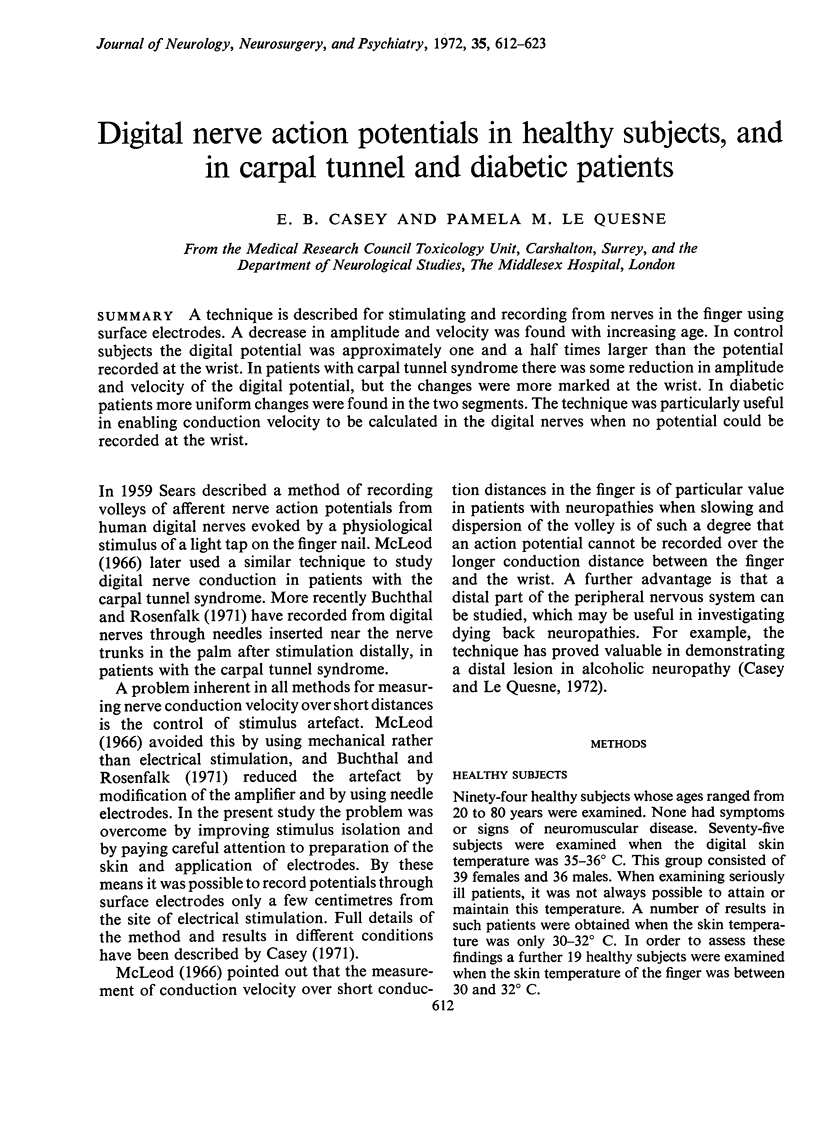
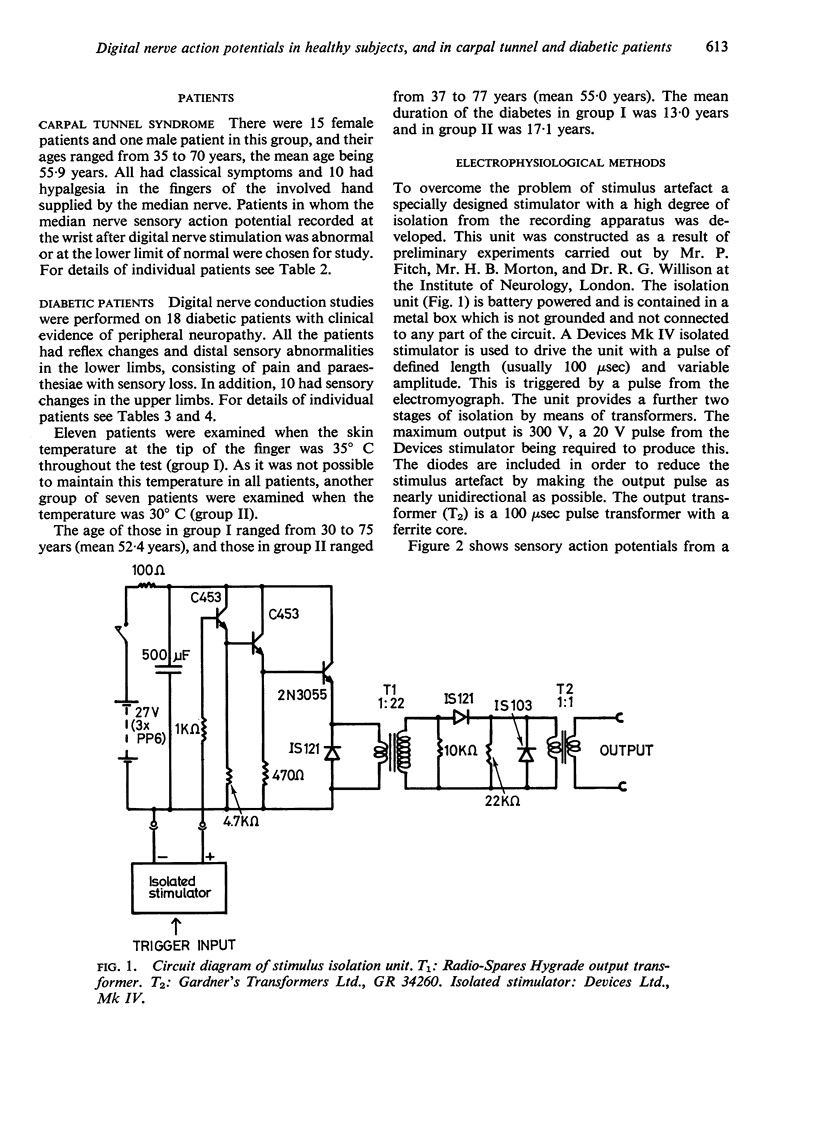
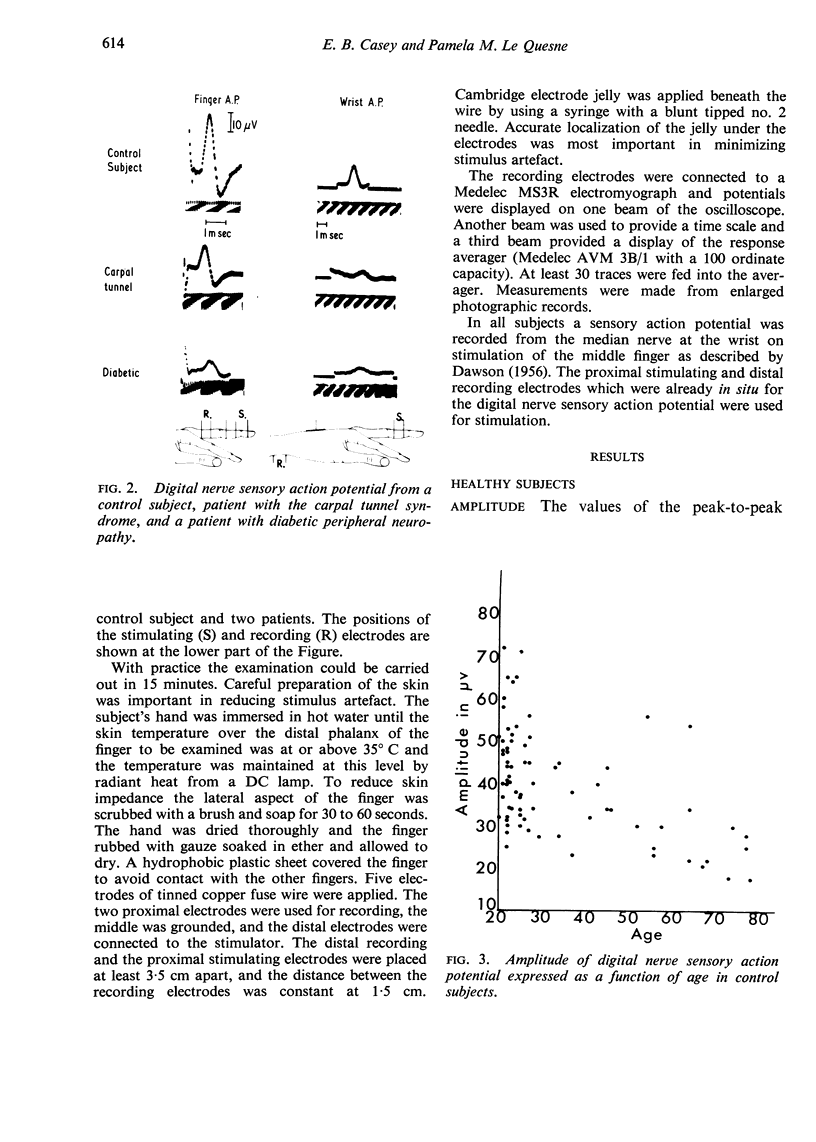
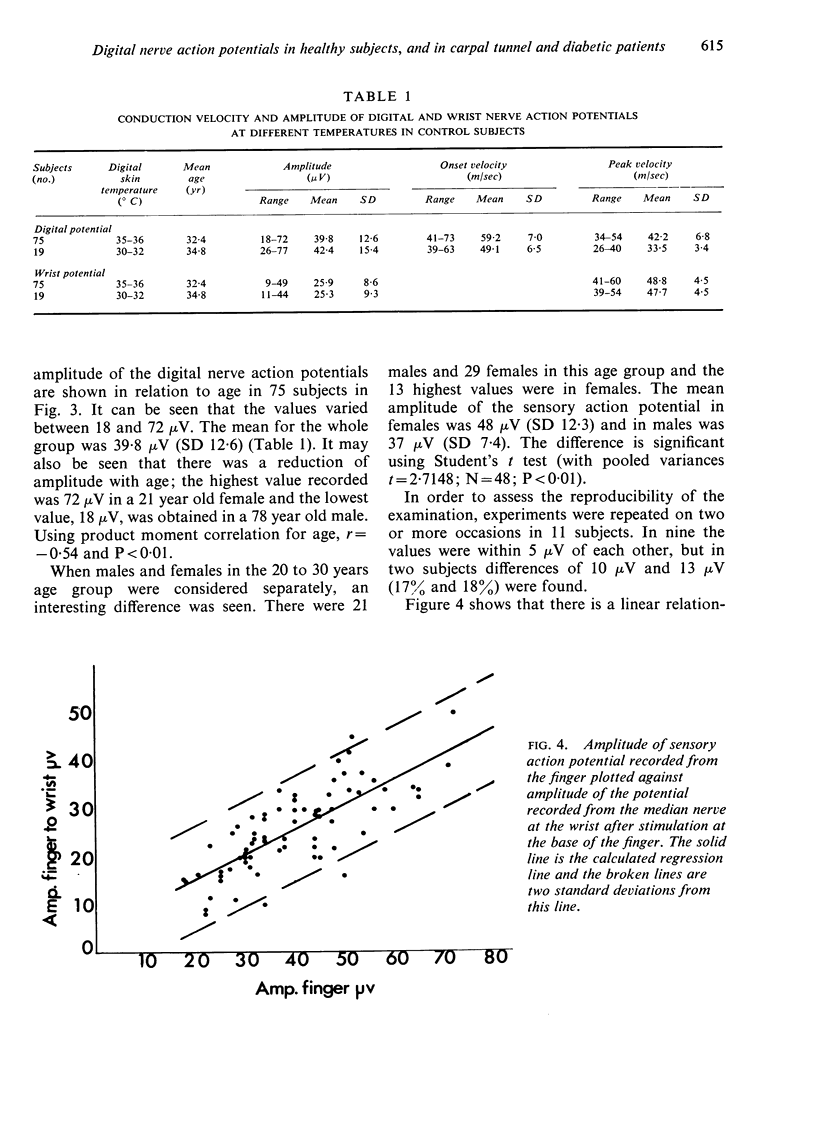
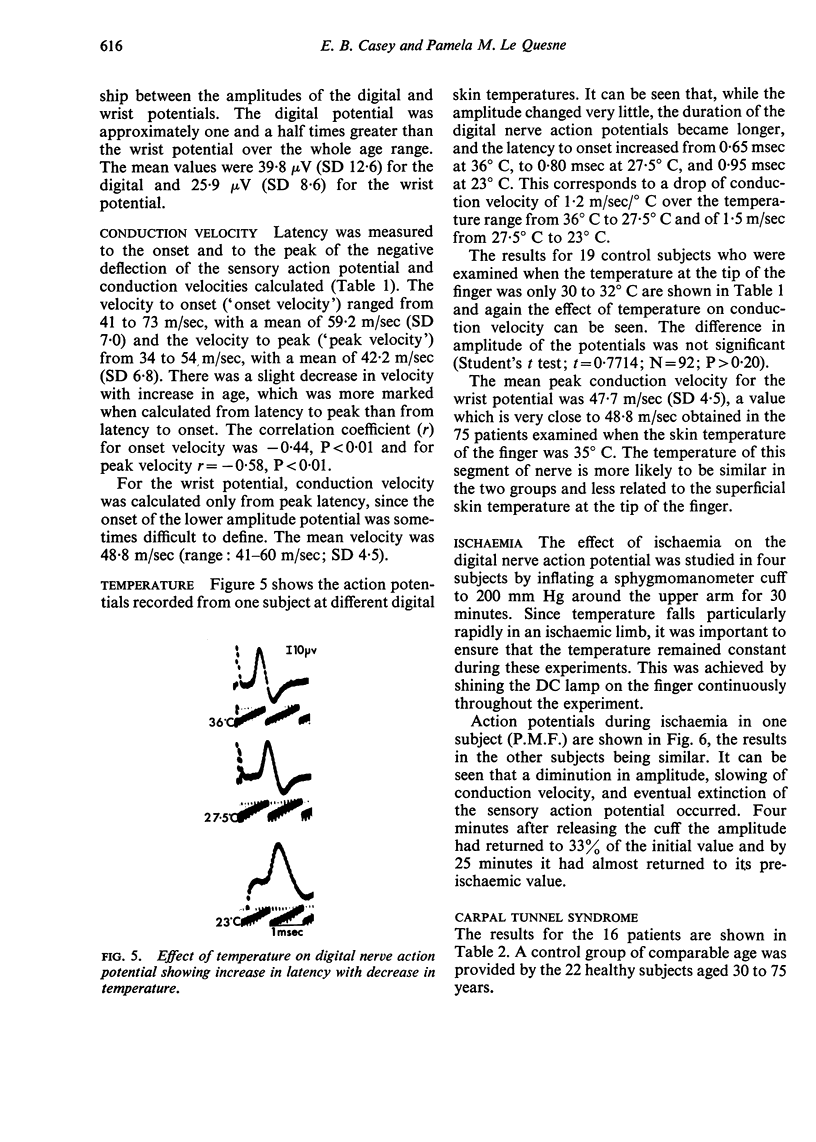
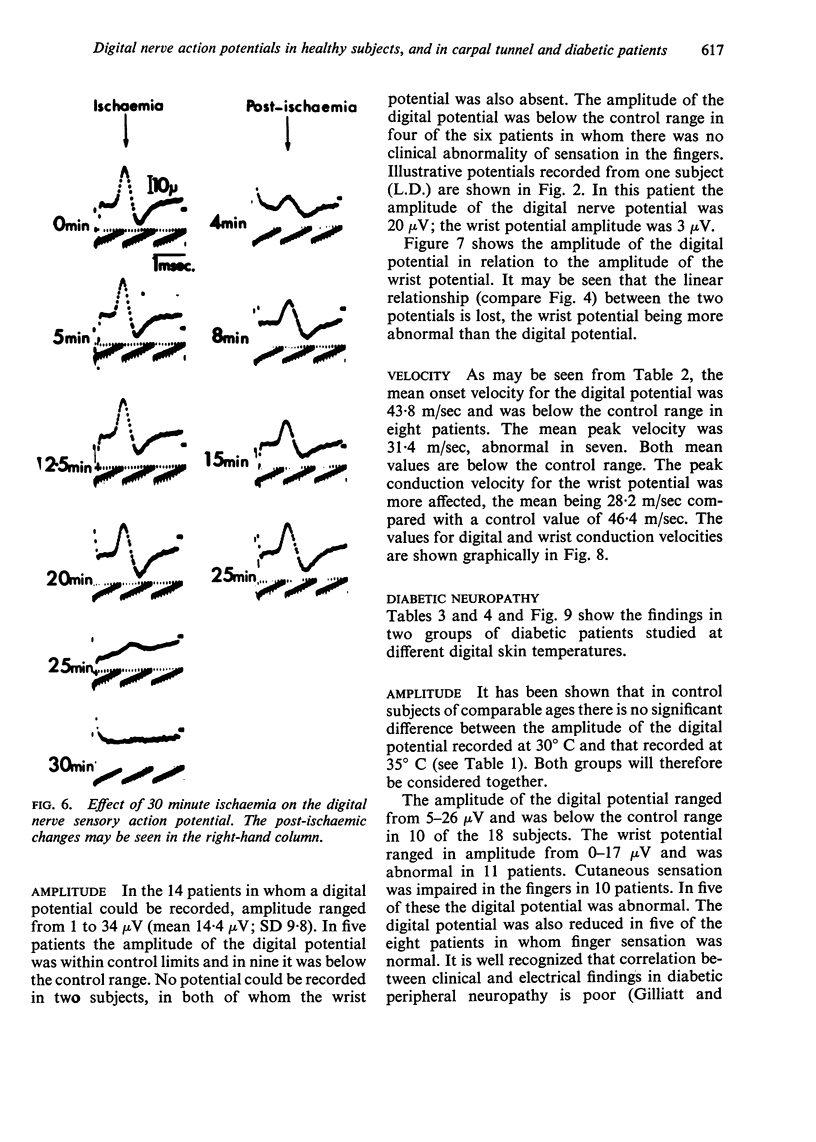
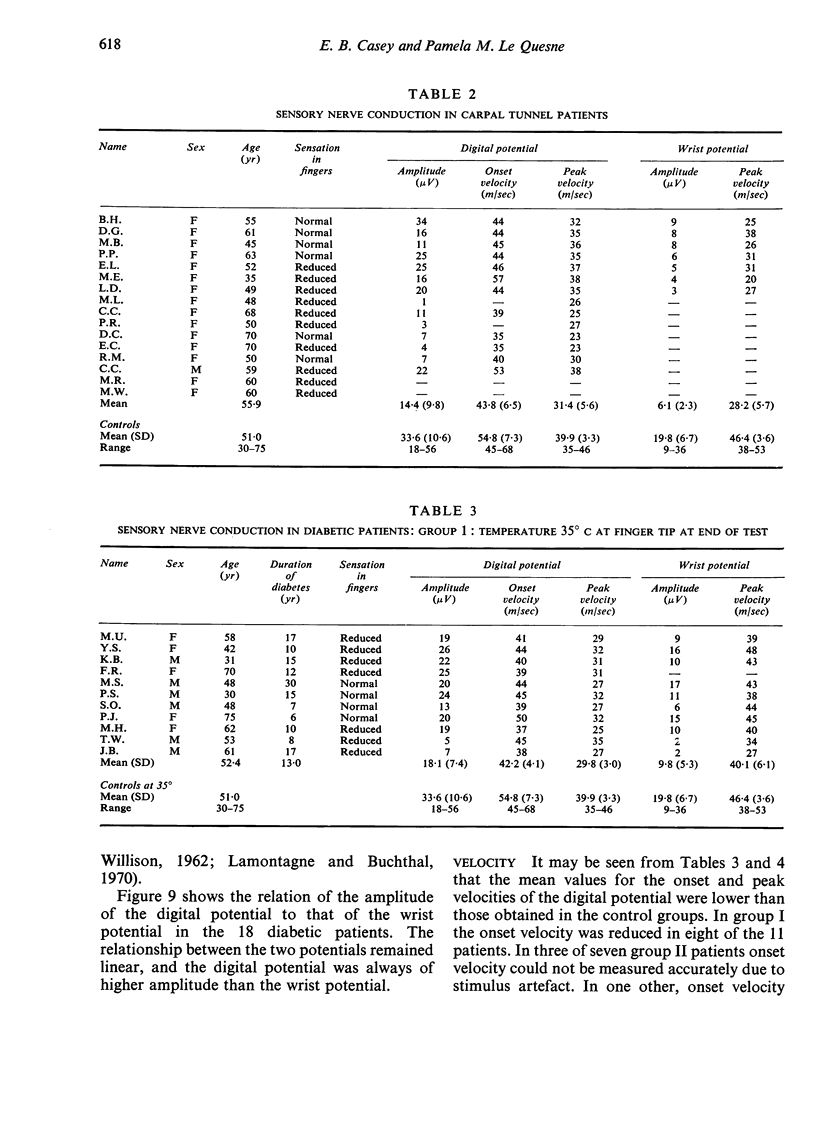
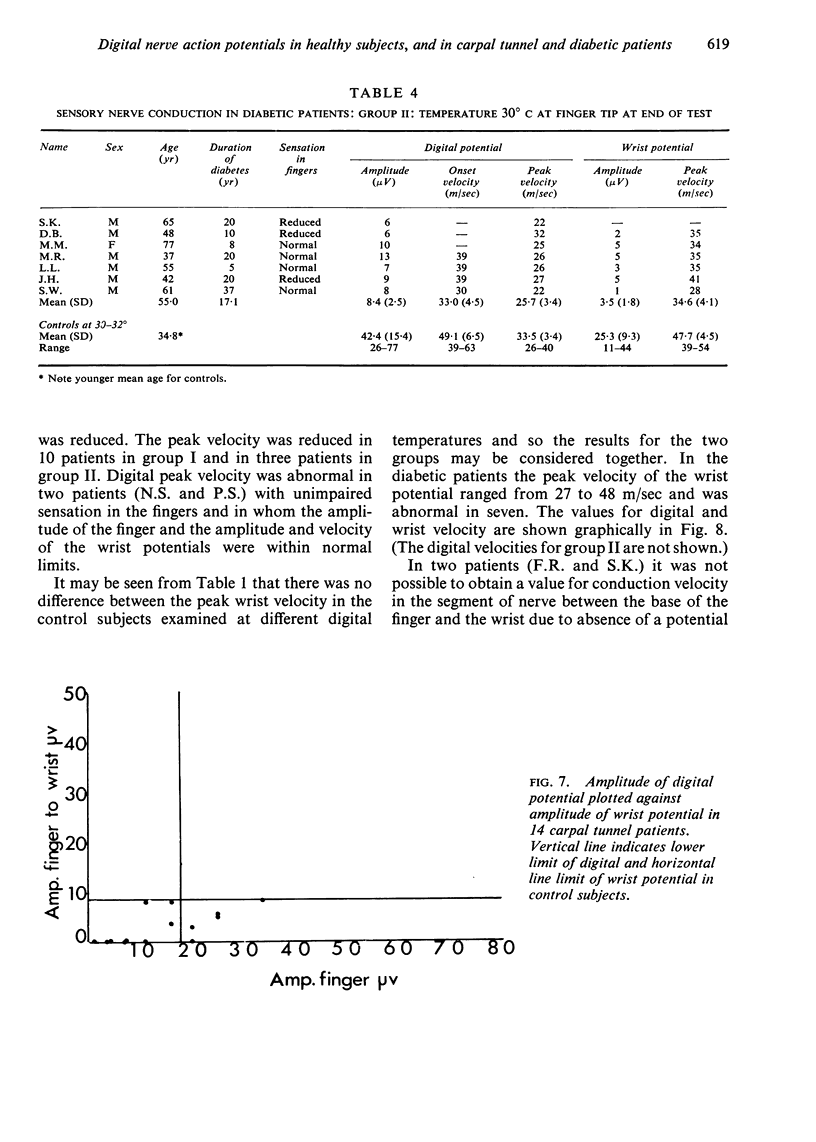
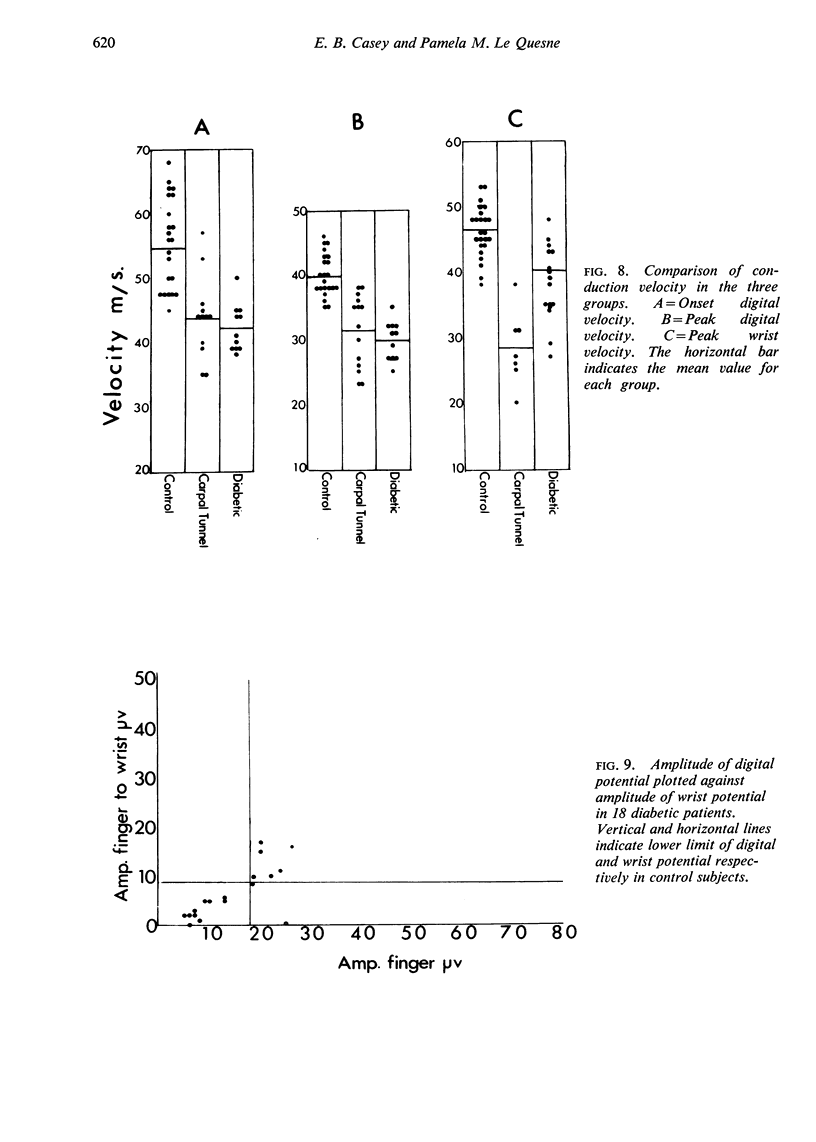
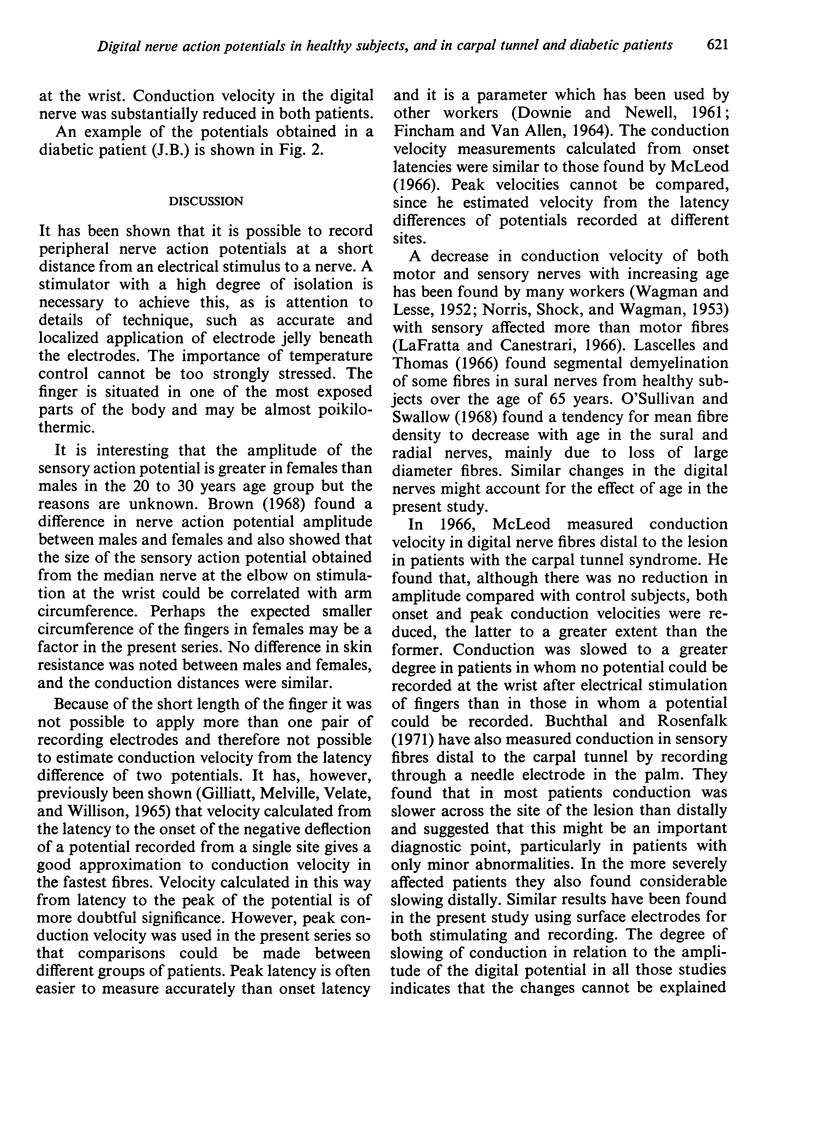
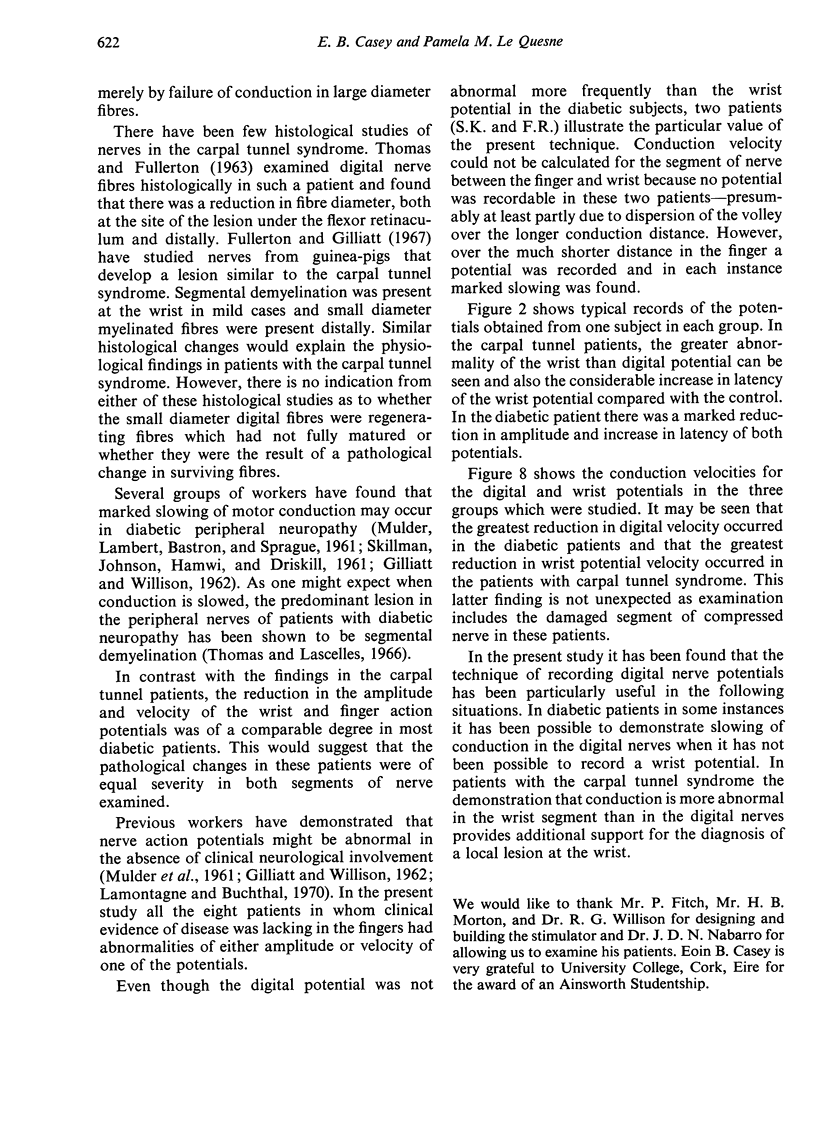
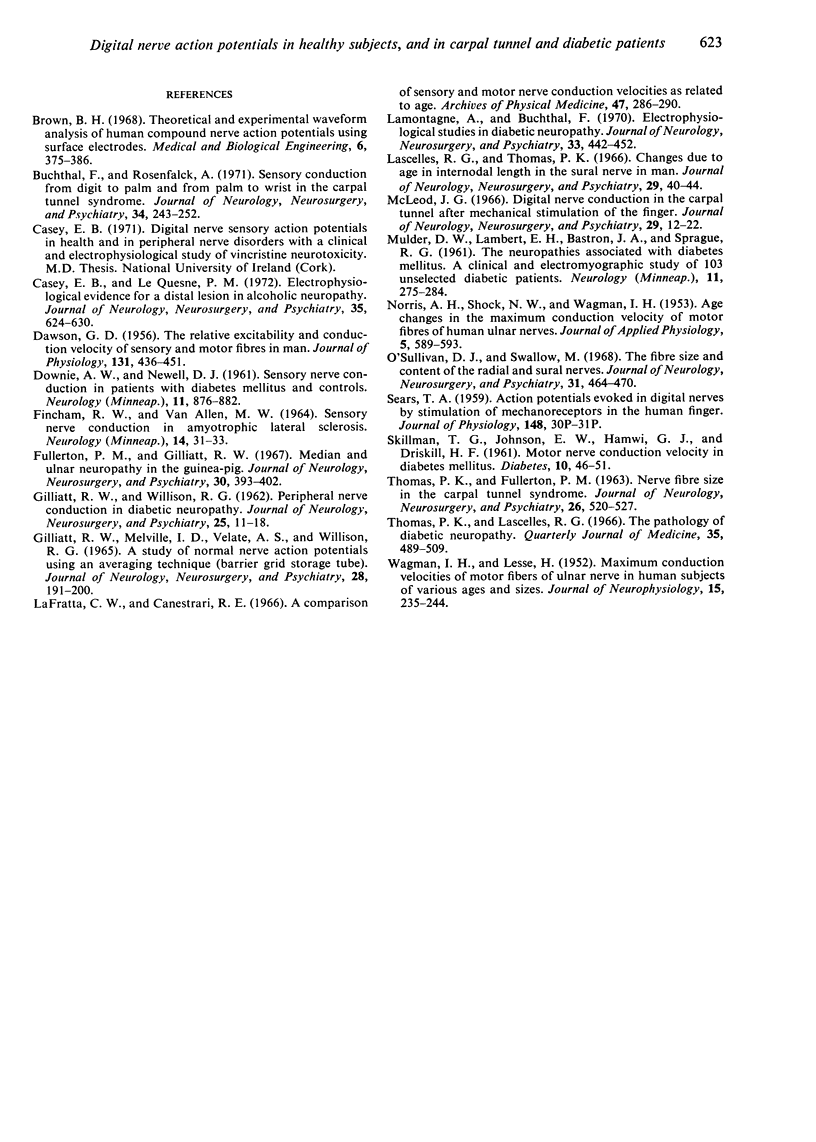
Selected References
These references are in PubMed. This may not be the complete list of references from this article.
- Brown B. H. Theoretical and experimental waveform analysis of human compound nerve action potentials using surface electrodes. Med Biol Eng. 1968 Aug;6(4):375–386. doi: 10.1007/BF02476059. [DOI] [PubMed] [Google Scholar]
- Buchthal F., Rosenfalck A. Sensory conduction from digit to palm and from palm to wrist in the carpal tunnel syndrome. J Neurol Neurosurg Psychiatry. 1971 Jun;34(3):243–252. doi: 10.1136/jnnp.34.3.243. [DOI] [PMC free article] [PubMed] [Google Scholar]
- Casey E. B., Le Quesne P. M. Electrophysiological evidence for a distal lesion in alcoholic neuropathy. J Neurol Neurosurg Psychiatry. 1972 Oct;35(5):624–630. doi: 10.1136/jnnp.35.5.624. [DOI] [PMC free article] [PubMed] [Google Scholar]
- DAWSON G. D. The relative excitability and conduction velocity of sensory and motor nerve fibres in man. J Physiol. 1956 Feb 28;131(2):436–451. doi: 10.1113/jphysiol.1956.sp005473. [DOI] [PMC free article] [PubMed] [Google Scholar]
- DOWNIE A. W., NEWELL D. J. Sensory nerve conduction in patients with diabetes mellitus and controls. Neurology. 1961 Oct;11:876–882. doi: 10.1212/wnl.11.10.876. [DOI] [PubMed] [Google Scholar]
- FINCHAM R. W., VANALLEN M. W. SENSORY NERVE CONDUCTION IN AMYOTROPHIC LATERAL SCLEROSIS. Neurology. 1964 Jan;14:31–33. doi: 10.1212/wnl.14.1.31. [DOI] [PubMed] [Google Scholar]
- Fullerton P. M., Gilliatt R. W. Median and ulnar neuropathy in the guinea-pig. J Neurol Neurosurg Psychiatry. 1967 Oct;30(5):393–402. doi: 10.1136/jnnp.30.5.393. [DOI] [PMC free article] [PubMed] [Google Scholar]
- GILLIATT R. W., MELVILLE I. D., VELATE A. S., WILLISON R. G. A STUDY OF NORMAL NERVE ACTION POTENTIALS USING AN AVERAGING TECHNIQUE (BARRIER GRID STORAGE TUBE). J Neurol Neurosurg Psychiatry. 1965 Jun;28:191–200. doi: 10.1136/jnnp.28.3.191. [DOI] [PMC free article] [PubMed] [Google Scholar]
- GILLIATT R. W., WILLISON R. G. Peripheral nerve conduction in diabetic neuropathy. J Neurol Neurosurg Psychiatry. 1962 Feb;25:11–18. doi: 10.1136/jnnp.25.1.11. [DOI] [PMC free article] [PubMed] [Google Scholar]
- LaFratta C. W., Canestrari R. A comparison of sensory and motor nerve conduction velocities as related to age. Arch Phys Med Rehabil. 1966 May;47(5):286–290. [PubMed] [Google Scholar]
- Lamontagne A., Buchthal F. Electrophysiological studies in diabetic neuropathy. J Neurol Neurosurg Psychiatry. 1970 Aug;33(4):442–452. doi: 10.1136/jnnp.33.4.442. [DOI] [PMC free article] [PubMed] [Google Scholar]
- Lascelles R. G., Thomas P. K. Changes due to age in internodal length in the sural nerve in man. J Neurol Neurosurg Psychiatry. 1966 Feb;29(1):40–44. doi: 10.1136/jnnp.29.1.40. [DOI] [PMC free article] [PubMed] [Google Scholar]
- MULDER D. W., LAMBERT E. H., BASTRON J. A., SPRAGUE R. G. The neuropathies associated with diabetes mellitus. A clinical and electromyographic study of 103 unselected diabetic patients. Neurology. 1961 Apr;11(4):275–284. doi: 10.1212/wnl.11.4.275. [DOI] [PubMed] [Google Scholar]
- McLeod J. G. Digital nerve conduction in the carpal tunnel syndrome after mechanical stimulation of the finger. J Neurol Neurosurg Psychiatry. 1966 Feb;29(1):12–22. doi: 10.1136/jnnp.29.1.12. [DOI] [PMC free article] [PubMed] [Google Scholar]
- NORRIS A. H., SHOCK N. W., WAGMAN I. H. Age changes in the maximum conduction velocity of motor fibers of human ulnar nerves. J Appl Physiol. 1953 Apr;5(10):589–593. doi: 10.1152/jappl.1953.5.10.589. [DOI] [PubMed] [Google Scholar]
- O'Sullivan D. J., Swallow M. The fibre size and content of the radial and sural nerves. J Neurol Neurosurg Psychiatry. 1968 Oct;31(5):464–470. doi: 10.1136/jnnp.31.5.464. [DOI] [PMC free article] [PubMed] [Google Scholar]
- THOMAS P. K., FULLERTON P. M. NERVE FIBRE SIZE IN THE CARPAL TUNNEL SYNDROME. J Neurol Neurosurg Psychiatry. 1963 Dec;26:520–527. doi: 10.1136/jnnp.26.6.520. [DOI] [PMC free article] [PubMed] [Google Scholar]
- WAGMAN I. H., LESSE H. Maximum conduction velocities of motor fibers of ulnar nerve in human subjects of various ages and sizes. J Neurophysiol. 1952 May;15(3):235–244. doi: 10.1152/jn.1952.15.3.235. [DOI] [PubMed] [Google Scholar]


